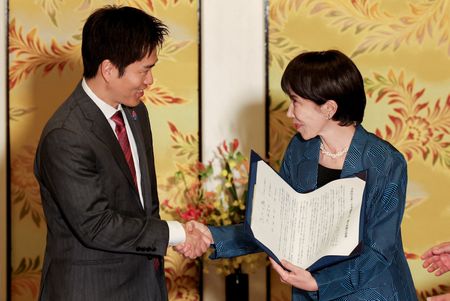By Kiyoshi Takenaka
TOKYO (Reuters) -Liberal Democratic Party leader Sanae Takaichi looks set to become Japan's first female prime minister after the right-leaning Japan Innovation Party, known as Ishin, said it was ready to back her premiership.
Parliament votes to pick the next premier on Tuesday. Here's how the votes may stack up for Takaichi.
HOW THE POLL WORKS
Any candidate who wins a simple majority of votes cast by the lower and upper houses of parliament will get the top job. If no-one secures a simple majority there will be a run-off vote between the two candidates with the most support in the first round, and in the run-off the winner is the candidate with the most votes even if they still don't have a majority.
If there is a disagreement between the two chambers, the choice of the lower house prevails.
WHAT TAKAICHI NEEDS TO WIN
The LDP holds 196 of the 465 seats in the lower house, well short of the 233 needed for a simple majority. With Ishin, their combined tally rises to 231. To drum up the two extra votes, the LDP has asked for cooperation from smaller new parties.
Takaichi's path to succeed Prime Minister Shigeru Ishiba had seemed all but certain after she won the presidency of the long-ruling LDP earlier this month, but then the Komeito party quit its 26-year coalition with the LDP, setting off a flurry of negotiations that led to the LDP's deal with Ishin.
Ishiba last year beat the head of the Constitutional Democratic Party in a run-off to become prime minister although the LDP-Komeito coalition lacked a majority, as some opposition parties stuck to voting for their party leaders, generating a pile of invalid votes.
OTHER CONTENDERS
The CDP, Japan's largest opposition party with 148 seats in the lower chamber, has decided to vote for its party chief Yoshihiko Noda after failing to win over other opposition parties to agree on a unified candidate, Kyodo news agency reported.
Yuichiro Tamaki, head of another opposition group - the Democratic Party for the People - has said his party and the CDP differ significantly on issues such as nuclear energy and security, making an alliance difficult.
(Reporting by Kiyoshi Takenaka; Editing by Hugh Lawson)







